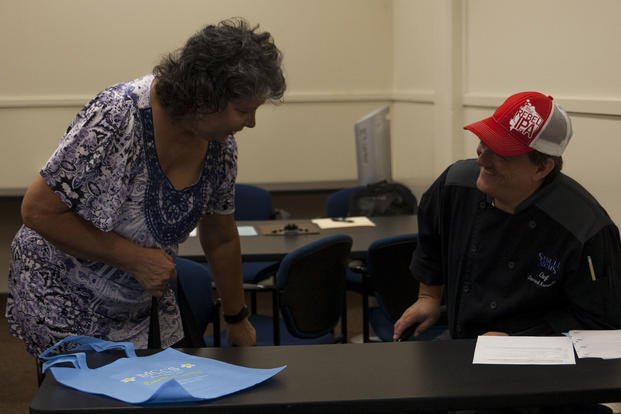You step into the hubbub of the career fair, take a deep breath and make your way toward a representative from the top-ranked company on your personal list. This is the company you want to work for, and the woman you are approaching is the first gatekeeper.
You make eye contact. Smile. Say hello. Your practiced firm handshake follows. And then ... you're on.
Even though no one yells, "Lights, camera, action!" this might be as close to an audition as you will ever come. What can you say and do during the next 60 seconds to make this recruiter want to explore the possibility of hiring you?
Several career services counselors recommend drafting an introduction as a brief "commercial" that allows you to sell yourself. Mark Reed, career counselor at California State University, Hayward, suggests developing an "elevator speech," a personal presentation just long enough to say to someone in an elevator before they reach their floor. (After all, you never know when or where an opportunity will arise to pitch yourself.)
Follow the Formula
College career counselors and employers alike suggest following a formula for your introduction. According to them, students should provide the following information during their introduction:
- Name
- Class (senior, junior, sophomore)
- Major
- Opportunities that you are seeking
- Relevant experience (work, internship, volunteer work)
- Highlights of skills and strengths
- Knowledge of the company
Tailor your introduction to each employer based on good research and knowledge of each company; this will generally impress recruiters. Ted Bouras, director of the Grainger Center for Supply Chain Management at the University of Wisconsin-Madison Business School, says you should articulate how you'll fit with the company based upon your research.
Do your research before the career fair. A list of employers attending is usually available prior to the event through the career services office. Most companies have websites that provide information about their products and services. Other resources such as annual reports, press releases and newspaper coverage are also very helpful and can usually be found on the internet or in the library with a little digging.
Ask an Engaging Question
Tracey Cross-Baker, associate director of career services and leadership education at St. Lawrence University in New York, suggests that you end your introduction by asking a focused question that will engage the employer in conversation. Robert Jankouskas, human resources analyst for the Pennsylvania Department of Transportation, said he often remembers students by the questions they ask during career fairs.
Cross-Baker suggests asking: "Could you tell me more about the new [product] you are developing?" or, "Could you tell me more about your financial management training program?"
Several things that career services counselors and employers say you should avoid doing include:
- Asking what the company does;
- Asking whether the company has any jobs; and
- When asked what type of position you are seeking, saying you would be willing to do anything at the company.
Practice to Perfection
Many career services counselors recommend practicing your introduction. "Winging it" is not a very wise plan of action, especially when a potential job is at stake.
You'll project confidence and charisma during your introduction if you are comfortable with what you are saying. Remember that the words that you say are just part of your presentation package to potential employers. Your overall manner and confidence are also critical components to the successful introduction. Your confidence and personality should be obvious, but not in an exaggerated or cocky way ... just a professional one.
Incorporate positive nonverbal communications, such as eye contact, facial expressions, body language, posture, etc. A mirror, a friend and/or a career services staff member are all good practice partners. Ask for constructive criticism and try it again.
A solid introduction will help you move on to the important next step -- the interview. A poor introduction, however, may put you on a slippery slope to the cutting-room floor.
Here's a sample introduction from a fictional college senior at Catalina College's annual career fair. She is an economics major and is about to speak with a recruiter from the Acme Financial Corp.
Hello. My name is Kathy Thompson, and I am a senior economics major at Catalina College. I noticed on Acme Financial's website that you have openings for financial managers, and I am interested in a position in this capacity. Last summer, I had an internship with Johnson Financial and was able to participate in a variety of company operations.
The most interesting project I worked on was redesigning the company's service demonstration events for the Southern California region. This was invaluable training because it afforded me greater insight into the finance industry and allowed me to show my ability as a team player. Perhaps best of all, it confirmed my desire to become a financial manager for a top-10 firm, such as Acme Financial.
I have been following your company's expansion into the greater Los Angeles area in the L.A. Times. I also read in Acme Financial's annual report that it is considering establishing operations elsewhere in Southern California. Could you tell me more about this proposed expansion? Could you also tell me about your financial management training program?
Want to Know More About the Military?
Be sure to get the latest news about the U.S. military, as well as critical info about how to join and all the benefits of service. Subscribe to Military.com and receive customized updates delivered straight to your inbox.











